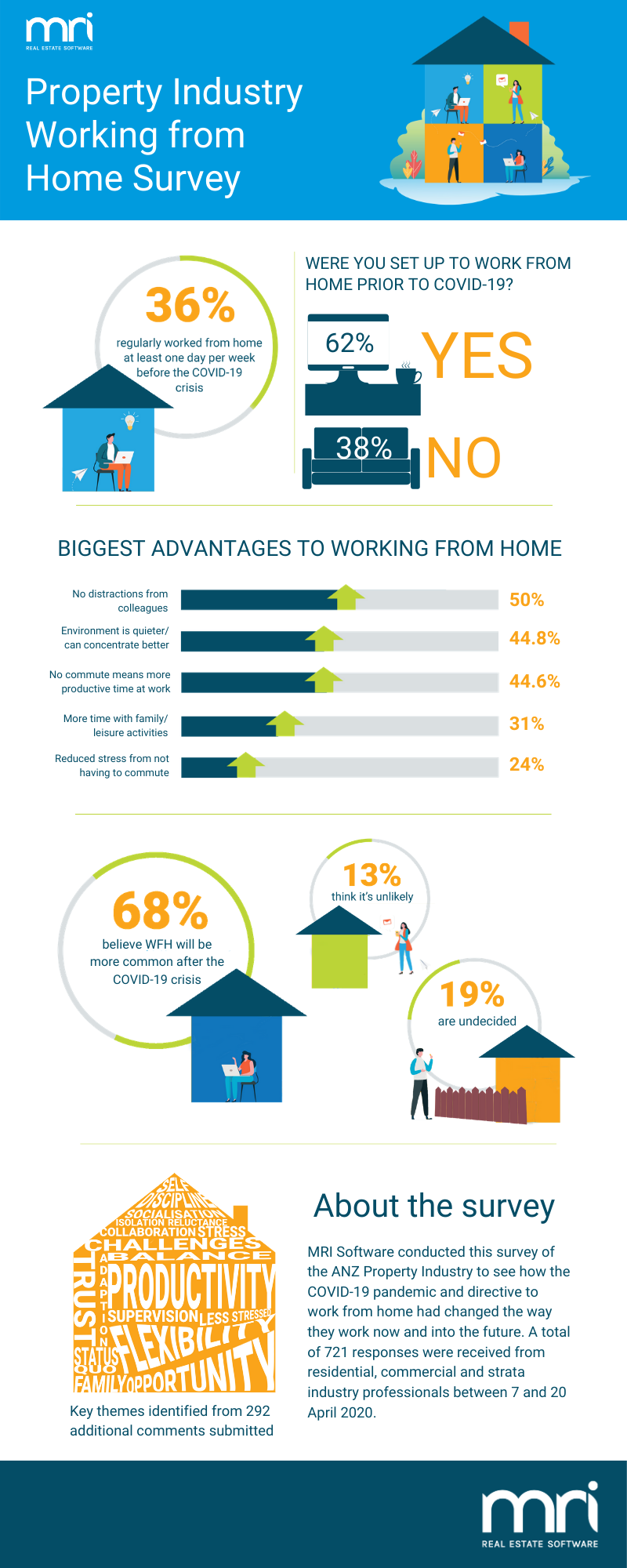Five things we learnt from the Property Industry WFH Survey
This blog post relates to Rockend, one of our previous brands. For more information please read the press release.
The COVID-19 pandemic has forced many property businesses to implement alternative work arrangements for their employees to comply with government regulations. One of these are work from home agreements that until this crisis is not exactly widespread in the industry.
To find out how property professionals are coping with this change in workplace environment and its effect on their business, as well as discover areas for improvement, MRI conducted a Property Industry Working from Home Survey last 7 April – 20 April 2020. Here are the key takeaways from the 721 respondents of the survey.
1. Working from home was an easy adjustment 
While about 64% of respondents did not have work from home agreements prior to the COVID-19 crisis, adjusting to the concept was quite easy for most. With 36% of respondents stated they already had an established working from home arrangement before the pandemic. This reflects that the impact to the way we do business has not been significant particularly those who operate with cloud-based software. The biggest hurdle was to adapt to social distancing rules for regular tasks of open houses, inspections and so on.
2. Less distractions increases productivity
Productivity is a common area of concern when implementing more flexible work arrangements. However, 54% of respondents felt more productive when working from home and another 23% stating that productivity is more or less the same as when working in the office. A key benefit to productivity was less disruptions and downtime due to socialising with colleagues. Many also find that because commute time has been eliminated, they have more time to be productive at work.
2. 3. Self-discipline is important to maintain a healthy work from home environment
Self-discipline is an underlying factor in minimising the blur between work and home life now that the physical distinction is not so clear.
Based on the survey, more than 50% of respondents said they are working more hours currently under a work from home arrangement. Most of this can be directly attributed to the unique circumstances brought upon by the pandemic, including managing rent reductions and delays and working through new federal and state legislation/regulations. Family stresses of home schooling and caring for young children was also prominent.
However, many have also found it hard to take regular breaks or clock-off on time and avoid looking at emails after hours
– usual challenges for remote workers even without the burden of a global crisis.
4. Many hope flexible work arrangements will be part of their future workplace
68% of respondents believe working from home will become more common in the property industry than prior to the COVID-19 crisis. Based on comments and responses, majority believe that while the traditional business model of face-to-face customer interactions didn’t exactly encourage remote work previously, the crisis highlighted its advantages in the way the industry will conduct business moving forward and promote happier less stressed employees.
5. But it’s also not for everyone
A third of Property Managers who responded felt it was unlikely that working from home will become more common. Most cited that as a service industry, property management and sales can’t run completely remotely.
Some of the respondents also stated that they felt more motivated when working in the company of their co-workers. Several business owners also expressed the importance of physical presence when mentoring junior staff and keeping positive team morale in the workplace.
More on the survey
Download the free eBook to read more on the Property Industry Working from Home Survey, including complete survey results and key insights.
Voice of the Strata Manager Report – 2023 Australian Edition
Strata management is a role of growing importance, value and influence in the Australian property landscape. Strata managers are responsible not just for managing the assets, maintenance, compliance and safety of Australia’s residences, but through t…

